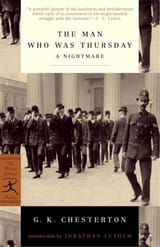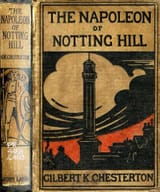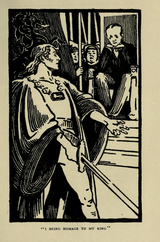Anonymous
7/20/2025, 11:44:09 PM No.24568137
This was pretty kino, what do you think of it?
I'm still utterly baffled by it, but from what I gather, the central premise is about nihilism and resentment of God/the universe for suffering and through that, a sort of milton-esque satanic temptation towards leftism, and the idea that this state of things can only be brought into balance and resentment can only be cooled by the suffering of Christ and the Idea that God shares our suffering with us as opposed to being some cold and distant entity which sits above it all, and of course the idea of the true face of the nature of our existence which we cannot see as mentioned in the quote:
>Shall I tell you the secret of the whole world? It is that we have only known the back of the world. We see everything from behind, and it looks brutal. That is not a tree, but the back of a tree. That is not a cloud, but the back of a cloud. Cannot you see that everything is stooping and hiding a face? If we could only get round in front
As gregory, the "true anarchist", and our milton-esqur satan stand-in says :
>I do not curse you for being cruel. I do not curse you (though I might) for being kind. I curse you for being safe!
I'm still trying to wrap my head around the significance of all of the council being policemen though. Is it a comment on our duality, perhaps? That there exists some intrinsic draw towards God within us, even the nihilists? I have no idea. Theres still a lot here I really dont understand
Also, Sunday reminded me a lot of what I've heard of the judge from blood meridian, in that thyere are these physically huge, unnatural, absolutely intimidating, larger than life, living existential symbols. I couldn't help but wonder if there was any direct inspiration there
I'm still utterly baffled by it, but from what I gather, the central premise is about nihilism and resentment of God/the universe for suffering and through that, a sort of milton-esque satanic temptation towards leftism, and the idea that this state of things can only be brought into balance and resentment can only be cooled by the suffering of Christ and the Idea that God shares our suffering with us as opposed to being some cold and distant entity which sits above it all, and of course the idea of the true face of the nature of our existence which we cannot see as mentioned in the quote:
>Shall I tell you the secret of the whole world? It is that we have only known the back of the world. We see everything from behind, and it looks brutal. That is not a tree, but the back of a tree. That is not a cloud, but the back of a cloud. Cannot you see that everything is stooping and hiding a face? If we could only get round in front
As gregory, the "true anarchist", and our milton-esqur satan stand-in says :
>I do not curse you for being cruel. I do not curse you (though I might) for being kind. I curse you for being safe!
I'm still trying to wrap my head around the significance of all of the council being policemen though. Is it a comment on our duality, perhaps? That there exists some intrinsic draw towards God within us, even the nihilists? I have no idea. Theres still a lot here I really dont understand
Also, Sunday reminded me a lot of what I've heard of the judge from blood meridian, in that thyere are these physically huge, unnatural, absolutely intimidating, larger than life, living existential symbols. I couldn't help but wonder if there was any direct inspiration there
Replies:



